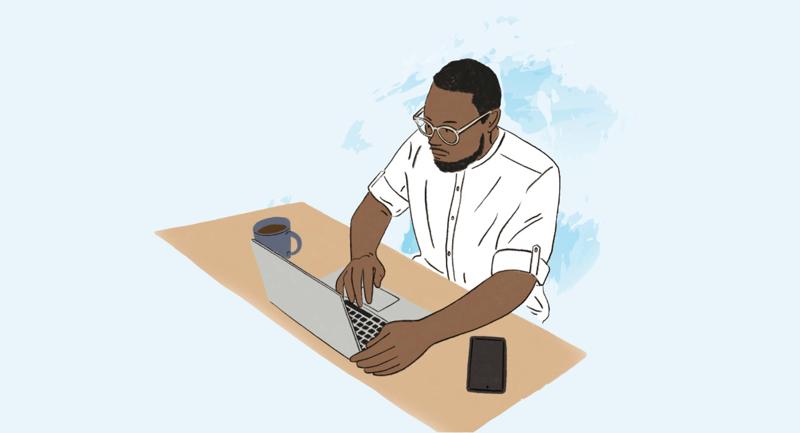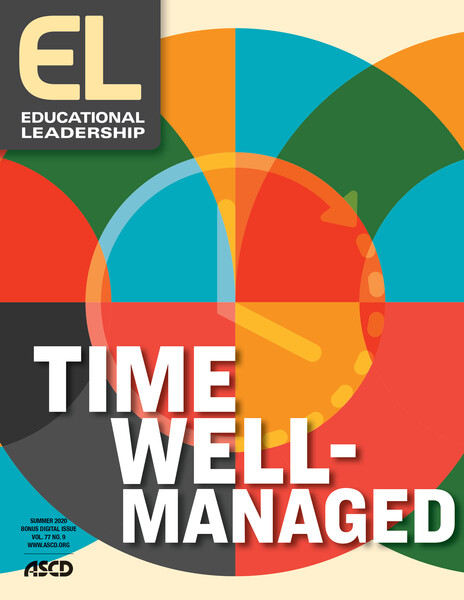Rebecca Mieliwocki: Balancing Tensions, Preventing Zoom Fatigue
Rebecca Mieliwocki, the 2012 National Teacher of the Year, is the coordinator of secondary professional development and new teacher induction in the Burbank Unified School District in California. She is the co-author of Adventures in Teacher Leadership: Pathways, Strategies, and Inspiration for Every Teacher (ASCD, 2019).
What does your typical workday look like since schools closed?
There have been different phases. Shortly after we closed, our superintendent pulled together our Instructional Response Team, which I'm on, to think through what distance learning would look like. Then I was responsible for coordinating a middle school team to write the curriculum for the first month. After that we did a lot of training with the teachers. So that first period was really my berserk time. It was pretty much 10 hours a day of Zoom meetings and coordinating all these different moving parts. It was a huge shift, a huge undertaking to get all this off the ground in a way that was very careful and thoughtful.
But since that first month or so, it's gotten a little quieter. I've gotten back to my old work, which is helping with teacher induction and working with mentors and mentees. Thankfully, we'd already used Google Classroom for that work, so that hasn't changed. The PD part of my work has shifted because everything of course is virtual now. And teachers' needs just shifted overnight. Now it's all about ways to use Google Slides, or Adobe Spark, or tricks for Google Classroom.
How much time would say you're spending online now?
Well, all day. We're all at our desks and ready to work by 8:30 or 9:30 a.m. I'm answering emails, I'm Google meeting with teachers who have specific needs around tech or curriculum. Yesterday I hosted a PD session for about 40 teachers on how to differentiate using Google Classroom. So still lots of Google Meet sessions and Zoom meetings, lots of texting, lots of cell phone calls, lots of email.
What would you say are the greatest challenges of working in this environment?
One of them is communication. It's been interesting to see how messages change as they flow through the different layers of the district—how priorities or instructions get muddled or contoured in these virtual channels. Maybe this is not a new thing, but I've become very aware of it—and I think it's exacerbated because we're not together. We have to spend more time clarifying directives, making sure teachers have accurate information.
The other major challenge is just this tension between moving forward with instruction but also realizing were in this period of tremendous loss and suffering—you know, striking that balance between curriculum goals and flexibility and compassion for students. That's been hard for a lot of educators—to know what to prioritize, what to hold back, and how to organize your work when there are just so many human elements in play. We just have to have that kind of fearless inventory of "What can I do to make this better for kids?" This is really an opportunity to let go of clinging to old systems.
In some ways, this is also a very isolating time for teacher leaders, since we are physically separated from teachers and don't really have first-hand experience of what they are going through. That's something that keeps me up at night.
Is there anything you're trying to model for the teachers you work with?
Yes, I'm not answering emails or texting or calling after work hours. I don't want to add to teachers' work, and I'm signaling to them to set a hard "out" for themselves every single day. And to be aware of Zoom fatigue. It's a matter of self-care. When you're at home and tied to your computer, it's way harder to set these boundaries.
How are you making time for self-care and things you enjoy?
I'm generally pretty good at sticking to a schedule, but this has been a challenge for me—there have been some days where I've just had to throw away my to-do list. So you have to get creative to make sure you're making time for yourself. A friend and I challenge each other to run three times a week, and to look for certain things on our route—like butterflies or signs or different colors. Then we text each other a picture of what we saw as proof that we did the run. I also try to take a regular lunch break, and I walk my dog a couple times a day. You just have to try to break the day into chunks—taking walks, reading for pleasure, doing a quick yoga class. You have to: If you just keep sitting here for hours, you're not helping anyone.
Editor's note: This interview has been edited for space.
—Anthony Rebora
N. Chaunté Garrett: Tending to Emotions, Finding New Ways to Connect
N. Chaunté Garrett, a former ASCD Emerging Leader, serves in eastern North Carolina as Head of School. She is an instructional leader with building- and district- level experience in transforming schools and leading students to high achievement levels.
What were the time-management challenges in switching to remote work for you?
The first week I tried to work remotely, I was not strategic at all. I was trying to be so accommodating and accessible that I put back-to-back meetings on my calendar all week long. I provided no guidance to my assistant on how to leave space in my calendar. By Tuesday, I was crashing, which is unlike me. I'd taken a lot on because I'd thought, "Hey, you're at home now, you have a lot of time." So, I had to go back to my assistant for help managing my calendar. I had all these meetings, but no time to prepare for any of them.
The next week, our big goal was just making sure I had a lunch break. It didn't even matter if I actually ate or not, but I just wanted to create "white" space where I wasn't engaging with people, where I had time to get something done.
Is there anything you're trying to model for the teachers you work with?
I've been attentive to where people are emotionally—and that's all over the place. It's about exciting the person who has energy and helping them keep momentum and also making space for the other person who is traumatized toward paralysis.
How do you make the most of the time when you are connecting with colleagues remotely?
Be strategic about communication. I've developed a weekly message I call Sunday Serenity. I realized that teachers have so many anxieties right now, so I try to send a positive, encouraging message about the things that keep them up at night. On Wednesdays, my emails are centered around professional development, a link to an article, or anything I've found that might be helpful. Friday's message is something fun and inspiring to lead into the weekend. Last Friday was right before Teacher Appreciation Week and so we gave staff an early gift of admission to an online conference.
I've also developed a Head of School hangout on Sunday afternoons to give the team a chance to talk about any challenges, ideas, or just check in on how everyone is doing. We kind of clear the air and get the week started off on a high note. It's optional and so good! I've loved the candidness and vulnerability of these conversations.
How do you make sure you have time for yourself and your family?
One thing that's gelled for me is to create white space at the beginning of the day—not starting immediately with a meeting. I can't do this every morning, but I've been making it a priority to go over to my mom's house and walk with her when I can.
I still have a habit of working too long, but when my last meeting of the day is over, I do get up and walk away. I may walk outside, I may spend time with my godchildren, have a game night, some fun. I'm still in the habit of getting dressed professionally, and at end of day, I change into regular clothes. What I do to turn that off-switch is varied, but I try to close the computer and walk away.
Has there been anything positive or surprising that's come out of this "new normal" that you'd like to continue once schools reopen?
I hope our teachers can take the time and look at new tools and try them out on kids. I want them to explore and see if this is something the kids enjoy, to be on the lookout for things we can carry over to the next year. This is a time for us to be the teachers we've always wanted to be, given that the accountabilities have been taken off the table. The relationships that have developed are amazing. We are connecting with families in a much more authentic way. We definitely want to be intentional about keeping that going after this.
Editor's note: This interview has been edited for space.
—Tara Laskowski





